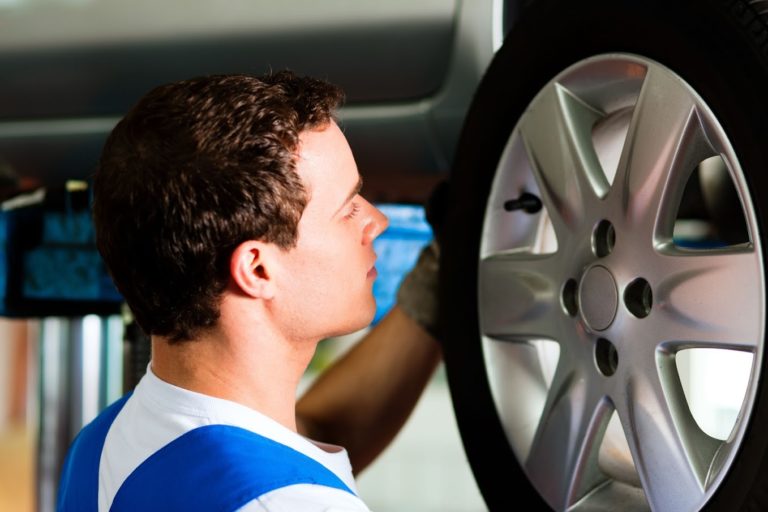The tire pressure management system (TPMS) installed on your vehicle is one step that car manufacturers have taken toward lowering unnecessary gas consumption in the U.S. Tires inflated at the incorrect tire pressure lead to lower fuel efficiency, so having a reliable method to ensure proper tire inflation is key to reducing vehicle emissions and over-reliance on oil.
The millions of vehicles with current TPMS installed are also safer for their drivers and passengers. Cars with underinflated tires are three times more likely to experience a collision or accident of some sort. A 2011 study found that TPMS is effective at preventing underinflated tires in over 55 percent of cases.
TPMS technology has been around for a little over 10 years. While many advances have created easier ways to manage them, the tire systems are best left to experts when it’s time for service, replacement or repair. Listed below are four reasons why you should let a pro handle your TPMS maintenance and service.
The Programming Is Not the Same as Relearning
A TPMS is basically a system of sensors. One sensor is installed on each individual tire. The sensor must be programmed to work with your specific vehicle before it’s put in place on the tire.
New multi-application TPMS sensors available in kits are ready to use straight out of the box. These TPMS are pre-programmed for instant installation. Most other systems must be programmed by the mechanic prior to installation. The three types of TPMS sensors that must be manually programmed prior to installation are:
- Cloneable
- Programmable
- Universal
Your TPMS professional uses a manufacturer’s protocol or application to program the sensors for your car, but that’s not enough. The sensors then have to go through a relearn procedure after installation to ensure the sensors and the system as a whole are working. Even the multi-application sensors must undergo the relearn process.
Some vehicles help sensors relearn by mandating a short period of driving. Most sensors must be helped to relearn with a scanner.
Issues Can Cause Relearn to Fail
The sensors will not complete the relearn process if there are issues causing communication problems between the sensors and the vehicle. The parking brake must be working, and the brake pedal may need to be depressed while turning the ignition on and off in a specific way.
Your TPMS may not work after reset because your key-fob remote is low on battery power. A serial data bus may be failing to relay information. An ABS or keyless entry module may be corrupted and not sending signals from the sensor to the dash.
An experienced tech who has the tools for TPMS diagnosis can figure out these problems quickly. On your own, you may not have the equipment or knowledge to discover which part is causing the problem.
TPMS Sensors Need Expert Attention at Any Tire Change
You can change out a tire yourself and just leave the sensor in place, hoping for the best. But ignoring the TPMS sensor is not a wise choice. If the sensor is not carefully handled at the tire change, a slow leak can develop.
At any tire change, have a TPMS-trained tech check out the sensor and other parts to make sure they’re in good shape. Have new service kits installed on sensors that are at risk of dry rot, as rot can cause slow leaks as well.
The nuts on the TPMS valve stem must be applied within a certain range of torque. Each system requires its own specifications, which can vary. If you use too much or too little torque to fasten the valve stem, your TPMS will not be accurate or reliable.
Sensors Must Be Changed at the Same Time
Car experts recommend you change both headlights even if only one has gone out because the other headlight is sure to fail soon. The same holds true for TPMS sensors. If one goes out, expect the other sensors to fizzle out in the near future.
Experts advise that you have all of the sensors replaced at once to avoid safety issues and the aggravation of replacing five sensors at five different times. You may be asking why you need five sensors. Your spare needs a TPMS in many models of vehicles. Your system may not work if you forget about inspecting and maintaining your spare tire’s sensor.
If you don’t have the right tools, replacing the sensors will take you a long time. Mechanics that do TPMS work have the tools for the work, and they stock the common brands of sensors and service kits to make repairs and replacements convenient for most drivers.
There are many considerations when managing your vehicle’s TPMS. Keep your warranties and your tires intact by scheduling routine professional service for sensors and tires at Evans Tire & Service Centers. Contact us today for replacement tires and auto service you can trust.

